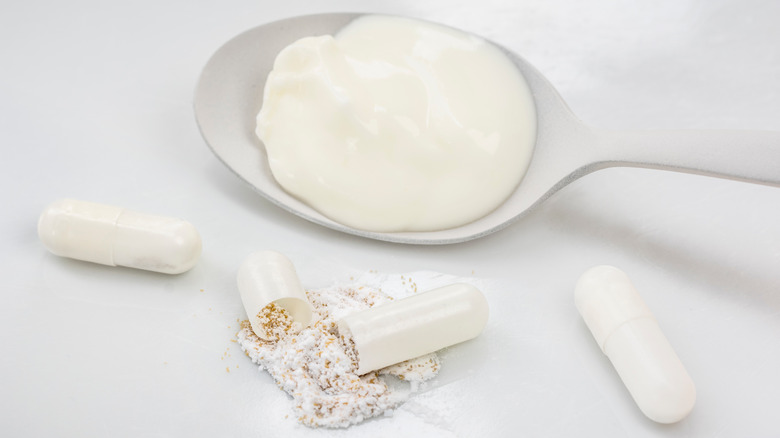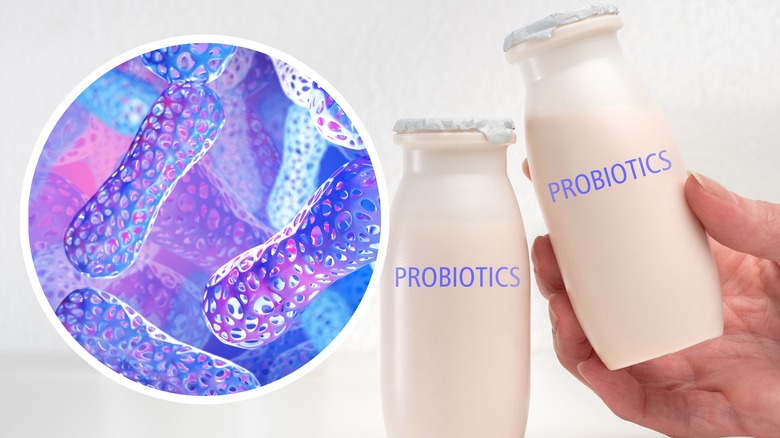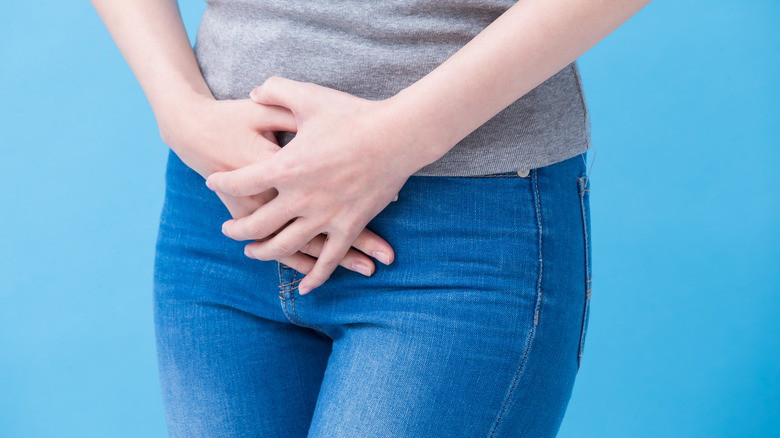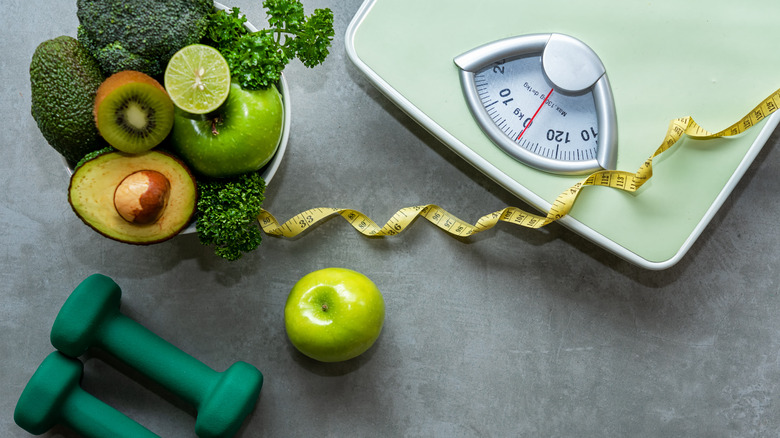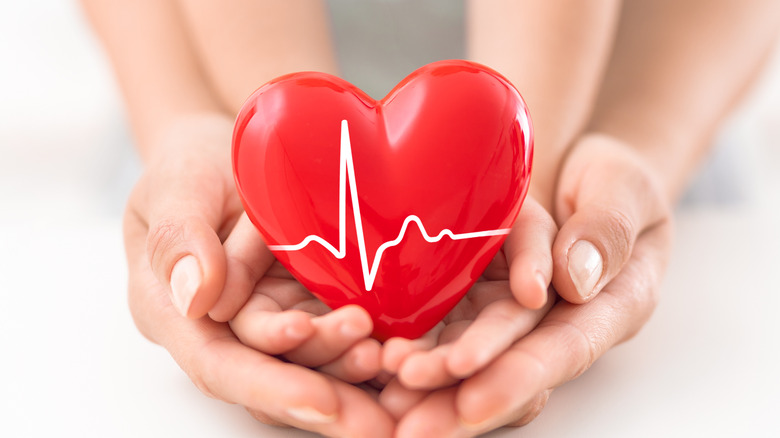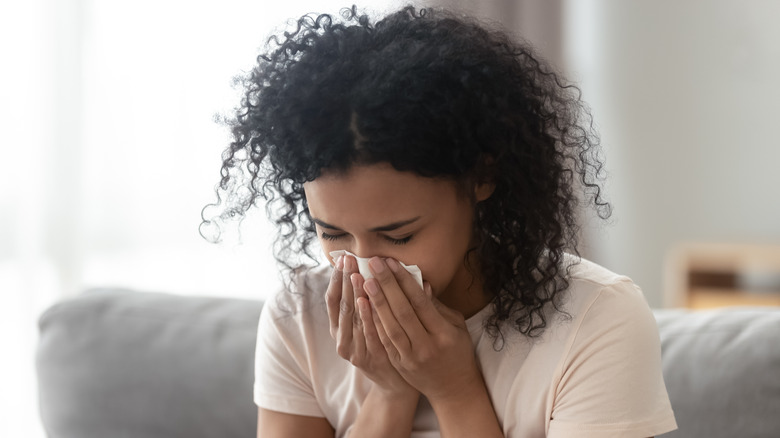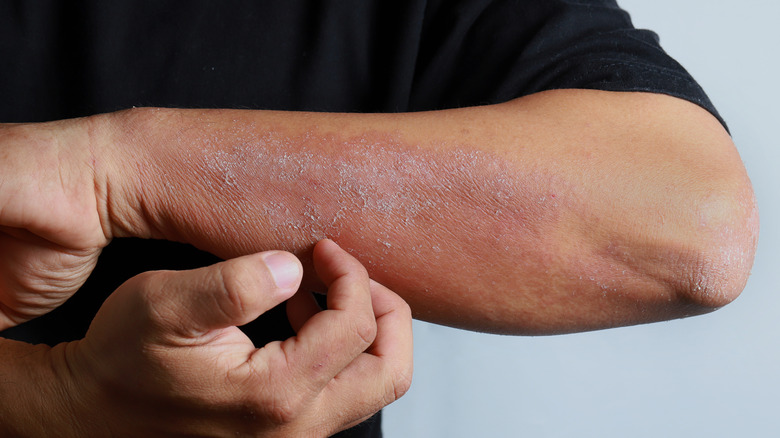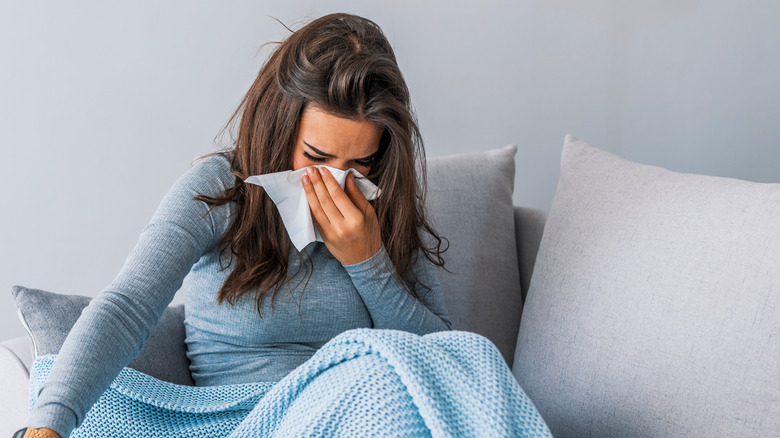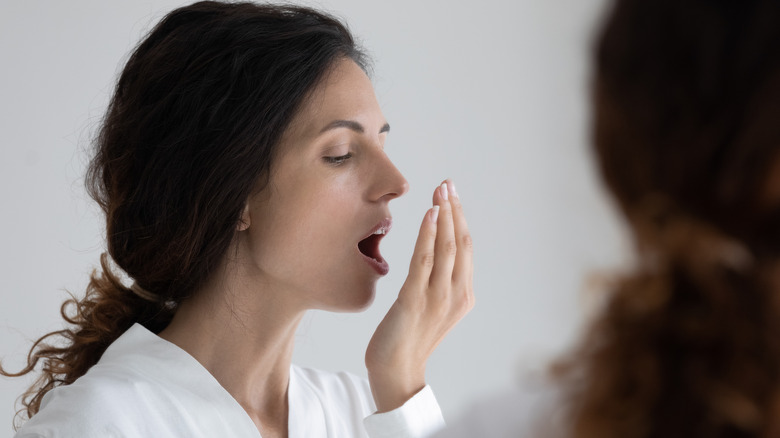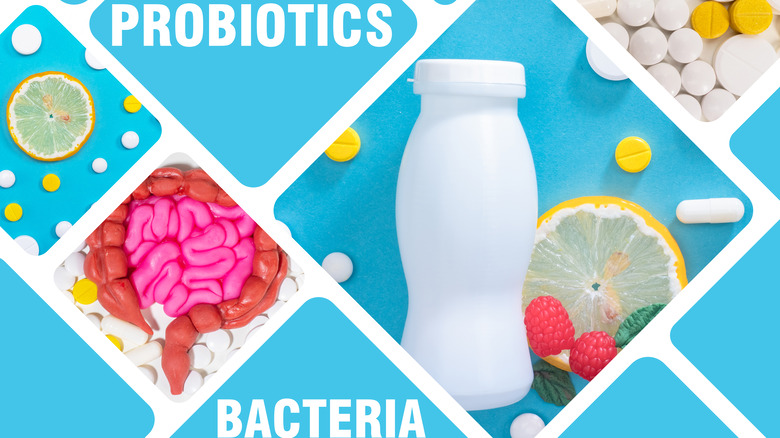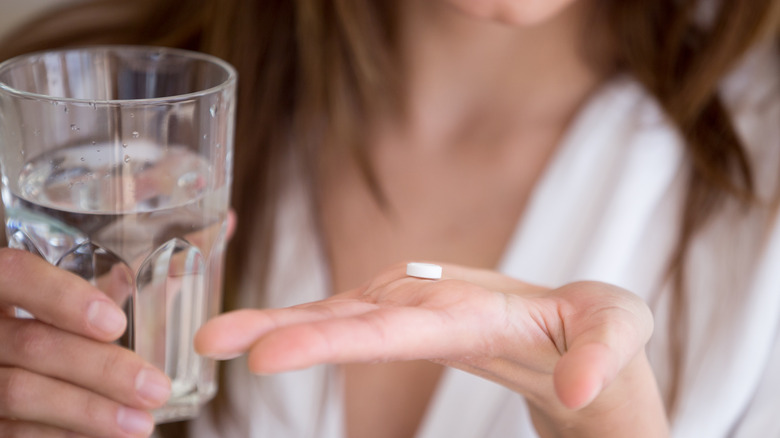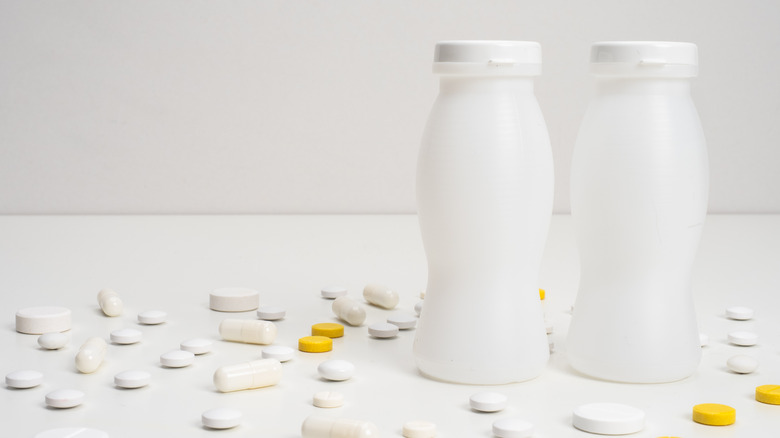Things That Happen When You Start Taking Probiotics
Probiotics, as you may have heard, are beneficial for your gut microbiome, which line the entire digestive tract and have a big impact on your health. Basically, the gut microbiome refers to the total of bacteria, viruses, protozoa, and fungi present in the gastrointestinal (GI) tract. Some types of gut microbiome can protect you from illnesses while others raise your risk for a variety of diseases. Gut microbiome is sometimes referred to as simply "gut bacteria."
Probiotics, which are found in some foods and supplements, are useful because they're a good type of bacteria. However, your body doesn't require probiotics to function because you already have healthy gut bacteria. Nevertheless, it doesn't hurt to consume them and add them to your diet.
Several species of probiotics, including Lactobacillus acidophilus and Lactobacillus casei, have actually been found to cause immune system changes and promote gut barrier functions. There is also significant research confirming that probiotics can treat symptoms of various conditions. Keep reading to learn more about the unexpected effects of taking probiotics on the body and mind and how you can safely incorporate probiotics into your diet.
Short-term side effects of probiotics
When you first start using probiotics, you might experience some side effects. Luckily, this is pretty normal, and they should subside within a few days.
Many people deal with gut issues when they first introduce probiotics to their system. "The two most common side effects, gas and bloating, are a normal response that happens when you introduce a new bacteria to your gut ecosystem," double-board certified integrative doctor Amy Shah told MindBodyGreen. This is simply a sign that your gut microbiome is trying to adjust. Another gut-related issue many people experience when taking probiotics for the first time is a change in the frequency of their bowel movements. Probiotics can cause your gut's transit time to slow, which means you might have fewer bowel movements than normal. This is nothing to worry about, and even though it's uncomfortable, it's another sign that those new gut bugs are hard at work. Once your body adjusts, you'll find that you become more regular and less bloated.
Those who opt to increase their intake of probiotic-rich foods instead of taking supplements might experience headaches as a side effect. This is because probiotic foods can contain amines. Some people are sensitive to amines and get headaches as a result of upping their intake. This is more likely to happen if you suddenly start consuming more probiotic-rich foods instead of gradually incorporating them into your diet.
Probiotics can balance out the healthy bacteria in your digestive tract
The research on probiotics shows they are promising for treating a variety of digestive-related diseases and balancing out gut health. A 2016 review of studies by the National Center for Complementary and Integrative Health (NCCIH) found probiotics were helpful in managing diarrhea in young and middle-aged people. Other research suggests probiotics can prevent traveler's diarrhea — a common travel-related illness resulting from eating contaminated food or drinking contaminated water.
Research on probiotic use for managing irritable bowel syndrome (IBS) has shown beneficial improvements on global IBS systems like diarrhea and abdominal pain, NCCIH explained. Additionally, probiotics also seem to be helpful in inducing or maintaining remission (absence of the disease) of ulcerative colitis.
It should be noted that most studies on probiotic use are small and don't really explain how probiotics improve digestive health or offer any information on dosing and side effects. Therefore, it is a good idea to always seek your doctor's advice when it comes to the specifics of managing a chronic digestive condition.
Probiotics can reduce vaginal and urinary tract infections
Probiotics may be useful in managing vaginal and bladder health, according to Harvard Medical School. This is because, much like the intestinal tract, the vagina and bladder can be thrown off balance because of things like antibiotics, birth control pills, hormones, and stress. Probiotic treatment can restore the balance of the vagina and bladder and reduce your risk for yeast infections, urinary tract infections, and bacterial vaginosis.
Probiotics are generally considered safe because they are already part of a normal digestive tract, as the Harvard report explained. It is a good idea, however, to read labels and make sure ingredients in probiotic foods and supplements are familiar to you and your doctor.
Additionally, there isn't enough conclusive evidence showing that probiotics are effective as conventional treatments. Therefore, it is important to get in touch with your doctor if you experience unusual vaginal odor, itching or burning, or painful urination. These symptoms can mean you have an infection that might require antibiotic treatment.
Probiotics might help you lose weight
Some researchers think probiotic supplements can be helpful in helping you to shed pounds. This is based on the idea that certain gut bacteria can affect weight, as explained by the Cleveland Clinic.
As part of a study cited by the clinic, researchers implanted gut-friendly human bacteria from people of different body sizes in mice. They found no weight changes for the mice that received gut bacteria from people of average weight, and weight gain in the mice that received gut bacteria from people who were overweight.
These findings suggest that probiotic supplements, along with a balanced and nutritious diet, may affect gut bacteria, and that a better balance could potentially lead to weight loss. Of course, because connections between weight loss and probiotics are still not well understood, you should talk to your doctor to find out what might work best for your unique health situation.
Probiotics can reduce inflammation and other arthritis symptoms
For people with different types of inflammatory arthritis — like rheumatoid arthritis (RA) and psoriatic arthritis — probiotics might be helpful in managing painful joint and skin inflammation. Probiotics appear to affect inflammation processes by reducing certain proinflammatory proteins, including C-reactive proteins, a 2015 report in Current Opinion in Rheumatology explained.
It is also not unusual for people with inflammatory diseases to have digestive problems like nausea, diarrhea, and constipation. Digestive symptoms are often due to the same inflammatory disease processes and medications used to treat these conditions.
The 2015 report went on to explain how gut microbiome contributes to the development of RA and other types of inflammatory arthritis. Here, researchers think unbalanced gut bacteria incite local inflammatory responses leading to a surge of negative cellular changes that negatively affect the harmony of a microbial community. But it might be possible to balance out gut microbiome to reduce inflammation and overactive immune system responses. According to a study published in Nutrients, probiotics may improve immune system and inflammatory responses. What was missing from this research, however, was specific dosing that could potentially help with inflammation.
Probiotics may improve anxiety and depression
One of the most interesting things researchers have found about the benefits of probiotics is the role they play when it comes to gut-brain connections. These connections show how a troubled gut can send signals to the brain, and how a troubled brain can send signals to the gut.
Probiotics have actually been found to improve anxiety and depression and have been involved in the treatment of both conditions, according to a 2020 meta-analysis published in Frontiers in Neurology. They seem to do this by eliminating inflammation in the GI tract. This, in turn, will regulate the stress hormones responsible for activating sympathetic nervous systems functions.
The 2020 meta-analysis aimed to understand the effectiveness of probiotics on anxious and depressive symptoms in people experiencing stressful conditions or living with anxiety and/or depression. What they found was consistent probiotic use could be helpful in reducing depressive and anxious symptoms in study participants with anxiety and/or depression, and in the healthy participants who were experiencing stress. The researchers suggested probiotic therapy could potentially be used as an adjunct therapy in the treatment of mood and emotional disorders, though more research is needed.
Probiotics can help level out blood cholesterol and keep your heart healthy
A number of studies have found that some probiotics can help to lower blood cholesterol in people with high levels, Healthline revealed. This is important because low-density lipoprotein (LDL) or "bad" cholesterol levels are a risk factor of cardiovascular disease. The higher your LDL, the greater your risk for heart disease will be. Low levels of high-density lipoprotein (HDL) or "good" cholesterol can also increase your risk.
Probiotic strains Lactobacillus acidophilus, which is a mixture of Lactobacillus acidophilus and Bifidobacterium lactis, or Lactobacillus plantarum might help to reduce your total cholesterol and LDL levels, the National Institutes of Health revealed (NIH). According to the NIH, probiotics work because they bind cholesterol in the intestines and stop it from being absorbed. They can also produce specific bile acids to metabolize fat and cholesterol. Additionally, some probiotic strains can produce short-term fatty acids to prevent cholesterol from forming in the liver.
Probiotics can help your immune system function better
Probiotics might give your immune system a boost and inhibit the growth of some types of bad bacteria. Good gut bacteria, according to the Cleveland Clinic, can in turn support immune system function and control inflammation throughout the body.
This good bacteria can also keep bad bacteria from making you sick as well as create vitamins and natural antibodies, help support the cells lining your gut and keep them from creating bad bacteria, and better break down and absorb medications, the Cleveland Clinic explained.
Additionally, probiotics may be helpful after taking antibiotics to fight off an infection. This is because antibiotics can kill both bad and good bacteria in your body, which is why people can develop diarrhea after antibiotic use. "The thought behind adding probiotics back into your body after taking an antibiotic is that it can repopulate the good bacteria that was destroyed by the antibiotics and re-boot your system," the clinic detailed.
Probiotics improve allergy symptoms
Probiotics can help balance good bacteria and produce better, more robust immune system responses to common allergens. That means probiotics may be helpful for managing hay fever and in preventing allergies, according to the National Center for Complementary and Integrative Health (NCCIH).
Some studies suggest probiotics can be helpful in improving symptoms of hay fever to a level where quality of life was also improved. The studies also showed only a few mild side effects from probiotic use for managing hay fever, this in comparison to the harsh side effects that come from allergy medications (via NCCIH).
Studies on the prevention of allergies looked at the use of probiotics in pregnant women and infants and have found exposure to probiotics could mean a lowered risk for developing atopic dermatitis, especially if there has been exposure to a variety of probiotic strains. However, the studies did not find any effect on hay fever, asthma, or wheezing.
Probiotics could mean a better night's sleep
Unfortunately, not much attention is usually given to the potential benefits probiotics may offer in improving sleep quality. Nevertheless, studies do show negative gut health leads to poor sleep and suggest probiotics might effect sleep quality by helping you to fall asleep quicker and even encourage restful sleep cycles because they influence mood and other aspects of mood regulation.
One 2019 study published Frontiers in Psychiatry found that sleep quality could improve after six weeks of probiotic intake. The study's authors noted that this is because probiotics can positively influence both mood and overall well-being.
Improvements noted by the study's authors included positive changes to depressive and angry feelings, less fatigue, and, of course, better sleep quality. The researchers confirmed their observations were consistent with previous studies that applied to healthy populations, and they further extended on those, noting they believed these improvements could apply to everyone.
Probiotics can improve acne and other skin conditions
When gut health is imbalanced, the immune system suffers, resulting in skin inflammation, like acne. Additionally, harsh skin products can disrupt microbiome living on top of skin, leading to skin breakdown. If you want to correct skin problems, focusing on gut health might be a good place to start.
A review of studies on adults with atopic dermatitis — a chronic skin disease associated with allergies — found that some probiotic strains can improve symptoms of the skin condition (via The National Center for Complementary and Integrative Health). Some studies have also identified links between probiotics — either taken in supplement form or used topically (applied to skin) — and acne reduction. But there hasn't been enough research to confirm probiotics can effectively treat acne, and the American Academy of Dermatology stated that there isn't strong enough to suggest probiotics can be a viable treatment (via NCCIH).
Still, including probiotics in your diet or adding to your skin routine might be a promising way to reduce the number of acne breakouts you experience. It may even reduce the number of harsh skin products you'd have to use otherwise to manage acne.
Probiotics might improve your recovery from viral illnesses
Probiotics may just help improve the body's recovery from viral illnesses. One animal study published in The Journal of Immunology found that probiotic supplements can protect the body from viral pathogens. In this case, it was found probiotic supplementation could improve survival from the pneumonia virus.
Here, researchers determined the mice were protected with live or heat-inactivated Lactobacillus plantarum or Lactobacillus reuteri against the lethal pneumonia strain. There was a 60 percent survival rate that continued for at least 13 weeks. The researchers concluded that by identifying these bacteria strains, they could potentially serve as critical, long-term protections against infection in the absence of a vaccine.
While probiotics can be helpful in improving recovery from viral illnesses, you should always seek your doctor's advice if you develop symptoms of a viral illness, such as coughing, sneezing, fever, inflammation, fatigue, vomiting, or diarrhea.
Probiotics can help fight bad breath
Probiotics aren't only good for your gut bacteria, they can also help stabilize the bacteria found in your mouth. According to Healthline, bad breath is often caused by an imbalance in either your gut or mouth bacteria, but luckily, there's a way to restore that delicate balance with oral probiotics. Even though more studies need to be conducted to understand how exactly probiotics work to fight bad breath, a small 2006 study found that they can help reduce the "bad" bacteria that are responsible for this pesky condition (via Journal of Applied Microbiology). A whopping 85% of participants who took the Streptococcus salivarius probiotic after rinsing their mouth with an antimicrobial mouthwash experienced a significant decrease in the bacteria responsible for bad breath. The same effect was not observed in those who took a placebo.
Another 2016 study conducted by the University of Connecticut confirmed the findings of the aforementioned study when it discovered that the K12 and M18 Streptococcus salivarius strains work very well when it comes to combating bad breath. These strains also kick inflammation to the curb and help prevent other oral issues like gum disease and cavities.
You might have more energy after taking probiotics
A great perk of using probiotics is that they have the ability to increase your energy, and most of us can do with an extra boost. Probiotics work hard to help your body absorb the nutrients from the food you consume, which in turn will make you feel more energetic (via Lifehack). "Maintaining a healthy gut microbiome can also boost immunity and energy by aiding in proper digestion and absorption of nutrients," gastroenterologist Julia Hughes told Popsugar. "So, not only is the microbiome responsible for protecting us against infection in the gut directly, it also contributes to our overall well-being by allowing us to use what we are feeding our body efficiently," she added.
A 2019 review published in Nutrition and Microbes found that probiotics do a great job of converting nutrients from food into six different B vitamins, which help replenish the body's energy reserves. Certain probiotic strains, like Bifidobacterium and Lactobacillus acidophilus, also aid the body in absorbing important energy-boosting minerals like manganese, magnesium, iron, and copper (via Lifehack).
Getting your probiotics from food and supplements
The best ways to increase the amount of good microbes in your body is through diet and with supplements. Fortunately, you are probably already consuming foods that contain probiotics and adding a supplement to your daily routine is very easy.
Fermented foods, like pickles and yogurt, contain a host of good bacteria. Fermented drinks like kombucha (a fermented tea) or kefir (a fermented milk beverage) both contain high amounts of probiotics, according to the Cleveland Clinic. Most cheeses are fermented, and some like Gouda, cheddar, and cottage cheese contain probiotics. Check food labels for live and active cultures to determine whether a food or drink is a good probiotic source.
You can also add supplemental probiotics to your diet. Probiotic supplements are available in various forms, including drinks, capsules or pills, powders, and liquids, the Cleveland Clinic explained. Because supplements aren't approved by the Food and Drug Administration, you should check with your doctor about the right type of supplement to help you target a specific health concern and improve your health and overall quality of life.
You should consider the safety of probiotic supplements
Probiotics are considered safe for most healthy people to take. However, there isn't a lot of research on how these supplements should be taken and the severity and frequency of side effects. According to the National Center for Complementary and Integrative Health, harmful side effects are more frequently seen in people with severe diseases and who have compromised immune systems.
Adverse reactions associated with probiotic use are infections, resistance to antibiotics, and development of harmful byproducts from probiotic supplements, the NCCIH continued. For some people, probiotic supplements can trigger an allergic reaction that causes mild stomach troubles like upset stomach, gas, bloating, and diarrhea , according to the Cleveland Clinic. This will go away after the body gets used to the supplement. If side effects persistent after a few weeks of use, stop using the probiotic and talk to your doctor.
Severe allergic reactions are rare. But if you experience a reaction that involves dizziness, swelling, or difficulty breathing, you should stop using the product and contact your doctor right away.
Improvement and benefits will take time and require correct and safe use
Most probiotics take time to do what you need them to do. If you're interested in adding probiotics to your diet, consult your doctor about the many supplements out there. If you don't see any digestive or other health improvements within a few weeks, the product you are taking likely isn't the best choice for you. If the product works, you should, at the least, notice digestive changes within a few weeks of use, according to the Cleveland Clinic.
To ensure a probiotic supplement is working, make sure you are following the recommended use instructions on the label and packaging. Some supplements need to be taken on an empty stomach, others with food, and some need to be dissolved in a liquid.
You should also check the product label for storage information. Some probiotic strains need protection from heat, oxygen, light, and humidity and can breakdown and lose effectiveness if exposed to these elements (via Cleveland Clinic). You may need to refrigerate these products. Finally, always use probiotics by their expiration dates and throw out an expired probiotic.

